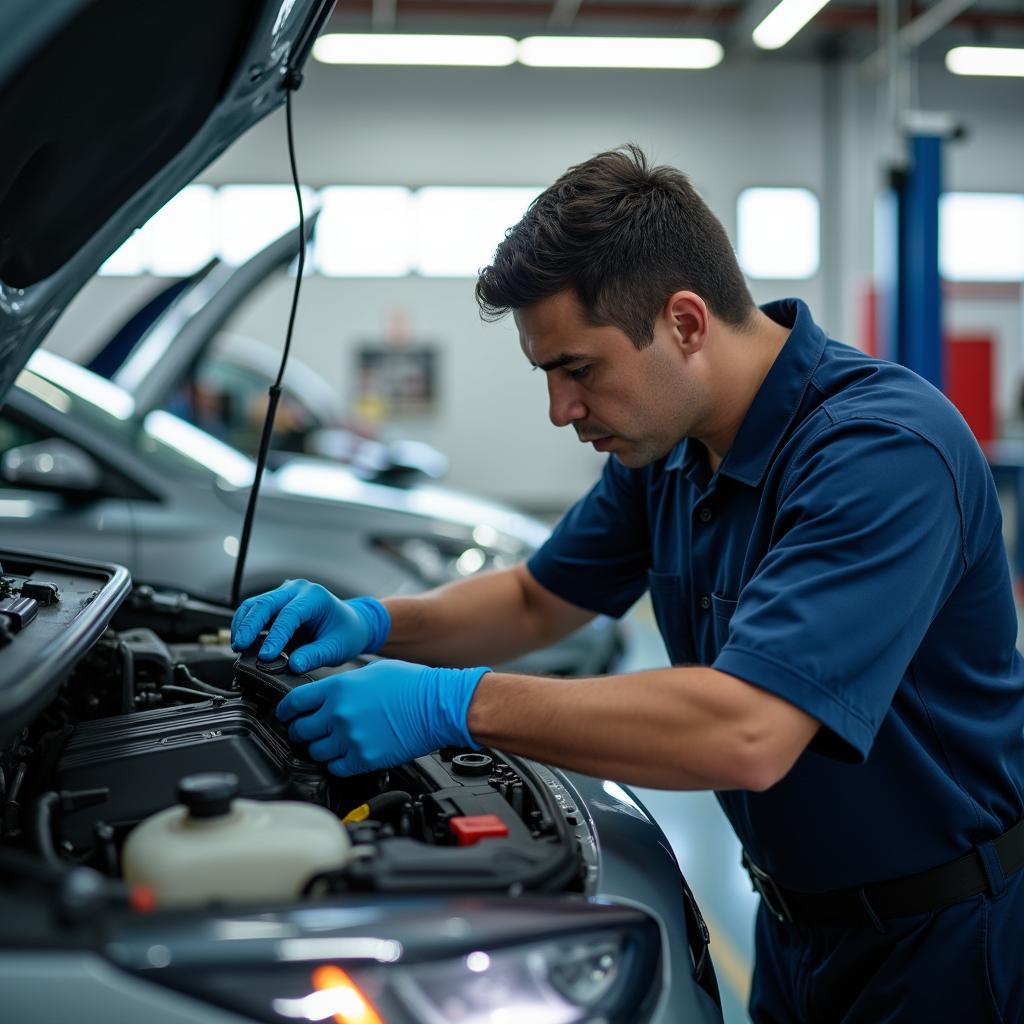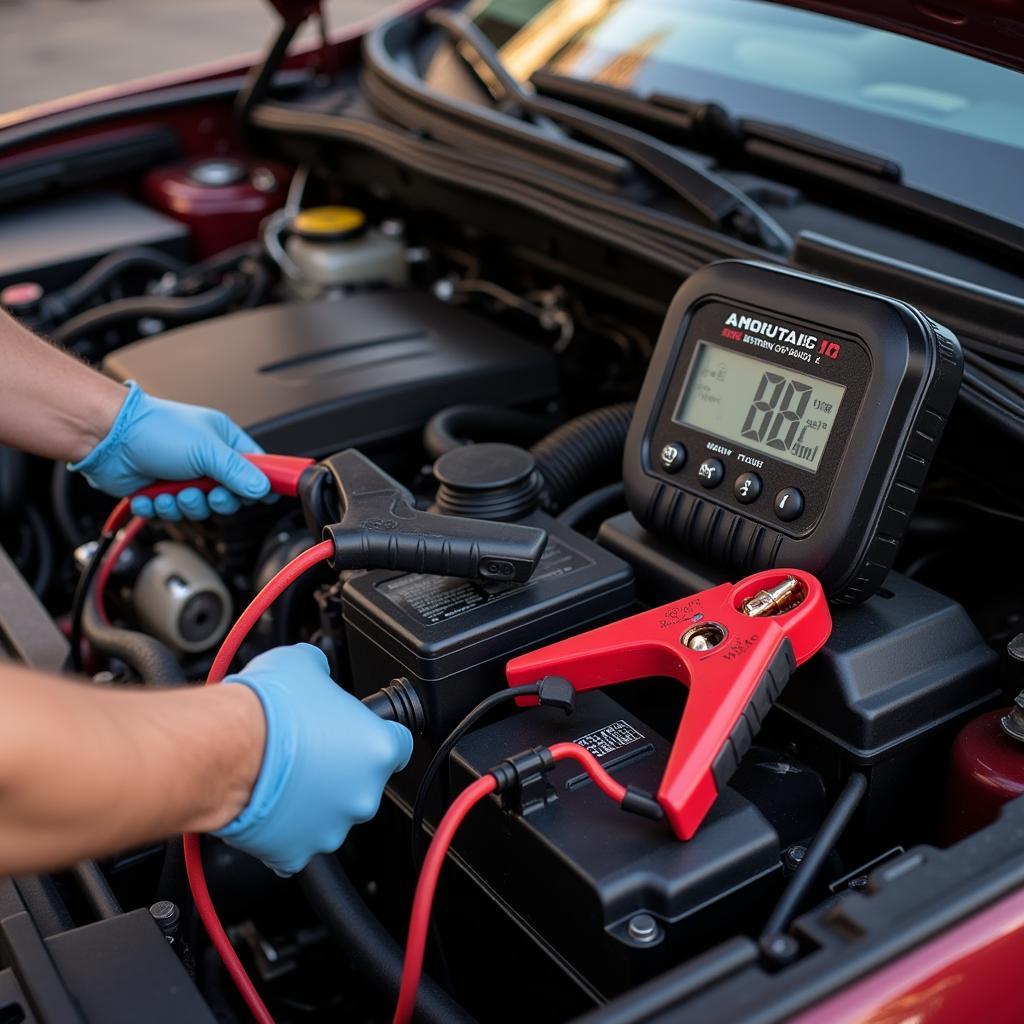Hybrid cars are known for their fuel efficiency and environmental benefits, but like any vehicle, they can experience issues as they age and accumulate mileage. This article will explore common problems found in high-mileage hybrid cars, offering valuable insights for owners, repair shop owners, and mechanics to ensure your hybrid continues to perform optimally.
Common Problems in High-Mileage Hybrid Cars
While hybrid cars generally share many components with traditional vehicles, some unique elements contribute to specific issues that arise with higher mileage. Here are some of the most common problems:
Battery Degradation
One of the primary concerns with high-mileage hybrid cars is battery degradation. The hybrid battery, responsible for storing and releasing energy, gradually loses its capacity over time and use. This decline can manifest as reduced fuel efficiency, decreased electric range, and even warning lights on the dashboard.
Hybrid System Malfunctions
The hybrid system, which comprises the battery, electric motor, and control electronics, is a complex and intricate component. Over time, components within this system can fail, leading to various issues like power loss, reduced acceleration, or a complete shutdown of the hybrid system.
High Voltage System Safety
Hybrid cars operate with high-voltage systems, which can pose a safety risk if not handled correctly. Damaged components, faulty connections, or improper maintenance can lead to electrical shocks or fires. Always exercise extreme caution when working with these systems and prioritize safety precautions.
Engine Issues
Despite being less stressed than traditional gasoline engines, the hybrid engine is still susceptible to issues like wear and tear, oil leaks, or engine malfunctions after accumulating high mileage. Regular maintenance and prompt attention to any warning signs are essential.
Addressing Common Hybrid Car Problems
Understanding Battery Degradation
“The hybrid battery is a vital component in hybrid cars, and degradation is a natural process with higher mileage. Owners should be aware of the signs and seek professional inspection if they notice any issues.” – John Thompson, Automotive Technician
Signs of Battery Degradation:
- Decreased fuel economy.
- Diminished electric range.
- Longer charging times.
- Warning lights on the dashboard.
- Reduced acceleration.
Solutions:
- Battery Replacement: In cases of significant degradation, a replacement battery may be necessary.
- Battery Conditioning: Some battery manufacturers offer conditioning services to optimize battery performance and lifespan.
- Driving Habits: Regular maintenance and careful driving habits, like avoiding extreme temperatures, can help extend battery life.
Diagnosing Hybrid System Issues
“A qualified mechanic with expertise in hybrid vehicles is essential for diagnosing hybrid system malfunctions. Incorrect troubleshooting can lead to further damage and costly repairs.” – Sarah Williams, Master Technician
Signs of Hybrid System Issues:
- Unusual noises from the electric motor.
- Loss of power or reduced acceleration.
- Dashboard warning lights indicating hybrid system faults.
- Malfunctioning regenerative braking.
Solutions:
- Diagnostic Scan: A comprehensive scan of the hybrid system can identify the source of the problem.
- Component Replacement: Faulty components, like the electric motor or power electronics, may need to be replaced.
- Software Updates: Software updates can address known issues and optimize system performance.
Prioritizing High Voltage System Safety
“High-voltage systems in hybrid cars are no joke. Always disconnect the high-voltage battery before working on these components and follow proper safety procedures.” – David Johnson, Master Electrician
Safety Precautions:
- Disconnect the high-voltage battery: Always disconnect the high-voltage battery before working on any components.
- Use insulated tools: Utilize insulated tools designed for working on high-voltage systems.
- Wear protective gear: Wear protective gear, including gloves, goggles, and a safety vest.
- Proper Training: Seek specialized training on hybrid vehicle safety protocols.
Maintaining the Engine
“Regular oil changes and tune-ups are vital for keeping the hybrid engine running smoothly, even with high mileage.” – John Thompson, Automotive Technician
Maintenance Schedule:
- Oil changes: Follow the manufacturer’s recommended oil change intervals.
- Tune-ups: Schedule regular tune-ups to inspect and maintain engine components.
- Coolant flushes: Flush the cooling system periodically to prevent overheating.
- Spark plug replacement: Replace spark plugs according to the manufacturer’s guidelines.
Tips for Keeping Your High-Mileage Hybrid Running Strong
- Follow the maintenance schedule: Adhere to the manufacturer’s recommended maintenance schedule for your specific hybrid model.
- Use high-quality fluids: Use high-quality engine oil, coolant, and transmission fluid.
- Drive gently: Avoid aggressive driving habits, which can put additional stress on the hybrid system.
- Avoid extreme temperatures: Exposure to extreme heat or cold can accelerate battery degradation.
- Get regular inspections: Schedule regular inspections by a qualified hybrid vehicle technician.
Conclusion
High-mileage hybrid cars can experience specific issues due to the complex nature of the hybrid system. By understanding common problems, following maintenance schedules, and addressing any issues promptly, you can extend the life and performance of your hybrid. Remember to prioritize safety when working with high-voltage systems and consult with a qualified mechanic for any significant repairs.
 A high-mileage hybrid car being inspected by a mechanic
A high-mileage hybrid car being inspected by a mechanic
For more information on high-mileage hybrid cars or to schedule an inspection, contact Autotippro.
AutoTipPro Contact Information:
Phone: +1 (641) 206-8880
Address: 500 N St Mary’s St, San Antonio, TX 78205, United States
FAQ
Q: How long do hybrid car batteries last?
A: Hybrid batteries typically last between 8 to 10 years, but this can vary depending on driving habits, environmental conditions, and maintenance.
Q: Can I replace the hybrid battery myself?
A: It’s not recommended to replace the hybrid battery yourself, as it involves high-voltage systems and specialized procedures. Seek professional assistance.
Q: Are high-mileage hybrid cars reliable?
A: While high-mileage hybrid cars can experience issues, they generally remain reliable with proper maintenance.
Q: How often should I have my hybrid car inspected?
A: It’s recommended to have your hybrid car inspected at least once a year, or more often if you notice any unusual symptoms.
Q: What are the signs of a bad hybrid battery?
A: Signs of a bad hybrid battery include decreased fuel economy, reduced electric range, longer charging times, warning lights on the dashboard, and reduced acceleration.






Leave a Reply